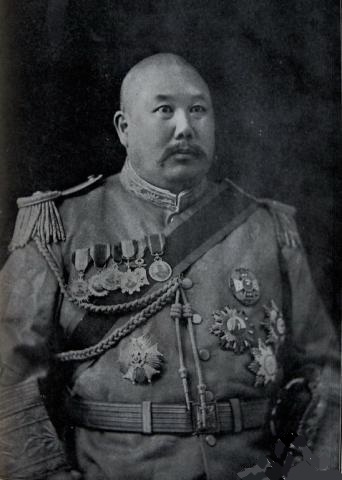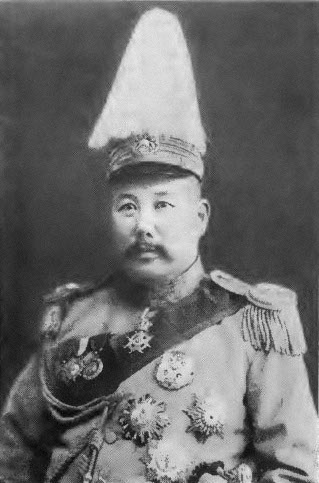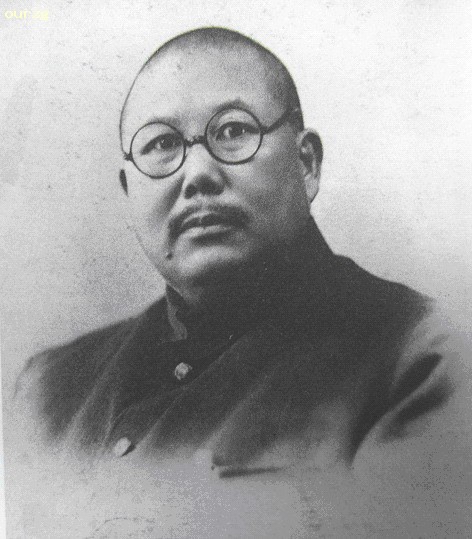<Back to Index>
- General of the Kansu Braves Ma Fuxiang, 1876
PAGE SPONSOR



Ma Fuxiang (traditional Chinese: 馬福 祥; simplified Chinese: 马福祥; 1876 19 August 1932) was a Hui Chinese military and political leader spanning the Qing Dynasty through the early Republic of China and illustrated the power of family, the role of religious affiliations, and the interaction of Inner Asian China and the national government of China.
Ma was born in Linxia, Gansu. He was named the military governor of Xining, and then of Altay, in Qing times. He held a large number of military posts in the northwestern region after the founding of the republic. He was governor of Qinghai in 1912, Ningxia from 1912 to 1920, and Suiyuan from 1920 to 1925. Having turned to Chiang Kai-shek in 1928, he was made chairman (governor) of the government of Anhui in 1930. He was elected a member of the National Government Commission, and then appointed the mayor of Qingdao, special municipality. He was also the president of the Mongolian Tibetan Commission and a member of the Central Executive Committee of the Kuomintang. He died in August 1932.
He belonged to haplogroup O.
It was said by American scholar Louis M.J. Schram that Ma Fuxiang himself was of Sant'a descent, who had assimilated into the Hui community. The Santa (San-t'a) are known as the Dongxiang people / They are Mongol Muslims.
Schram reported that Ma Fuxiang's Sant'a ancestors belonged to a group of Mongols who converted to Islam under threat of death during the Qianlong Emperor's rule (1736 1796), since the area where they lived, around Hezhou, was dominated by Muslim Salar rebels at the time. Another separate group of Mongol Muslims existed in Hezhou's east. Their leaders claimed a lineage from the Yuan dynasty royal family.
However, no other source mentions this. He is just said
to be a Hui with no mention of
San-t'a / Dongxiang Mongol ancestors.
Ma Fuxiang was the son of Ma Qianling. His elder brothers were Ma Fucai (馬福財), Ma Fulu and Ma Fushou. He received an education in the Quran and Spring and Autumn Annals. In 1889 he joined Ma Fulu in the martial arts hall; after three years he and Ma Fushou attended military school. In 1895 he served under Gen. Dong Fuxiang, leading loyalist Chinese Muslims to crush a revolt by rebel Muslims in the Dungan revolt (1895 1896). His Muslim troops massacred the rebel Muslims, delivering their severed heads and ears to their superiors. In 1897 Ma Fuxiang received a military Juren degree.
Ma graduated in military science, having passed provincial examinations. Under the Qing dynasty he was promoted to Brigadier General at Palikum, New Dominion. (Xinjiang). He received his military training at Military School in Kansu.
Ma was transferred along with his brother Ma Fulu and several cousins as officers under Gen. Dong Fuxiang to Beijing in 1898. During the Boxer Rebellion, the Muslim troops came to be known as the "Kansu Braves", and fought against the Eight Nation Alliance. Ma Fuxiang killed many foreigners in combat. Ma led a cavalry charge against an allied European army at the Battle of Langfang, defeating them and forcing the Europeans to flee. He and Ma Fulu personally planned and led the attack, encircling the European troops with a pincer movement. The western invasion of Peking was derailed by their efforts for another month. Ma Fulu and four of his cousins were killed in action in 1900 in Beijing during the Battle of Peking (1900). He had commanded a brigade, and Ma Fuxiang took over the position after his brother's death. For the rest of the Boxer Rebellion his unit engaged in the Siege of the International Legations (Boxer Rebellion). He escorted the imperial family to Xi'an.
In March 1909 at Palikun, Xinjiang, he served as a
"Brigade General". From July to August 1912 Ma was "Acting
Chief Executive Officer of Kokonur" (de facto governor of
Kokonor, later Qinghai Province). On 10 October
1912, he was in Altai as the "Commader of the
Guards Division".
During the Xinhai Revolution in 1912, Ma Fuxiang protected a Catholic mission from attacks by the Gelaohui in the Sandaohe district, and he also protected another Catholic mission from attacks in 1916. He and his nephew Ma Hongbin received the Order of Leopold (Belgium) for their work.
Ma Fuxiang was named military commander of Ningxia by president Yuan Shikai. Ma captured a Mongol separatist in Baotou and executed another Mongol prince who tried to declare himself emperor, a Buddhist monk named Ta-er Lilu-chi (Wu Daer Liufi). He was supported by the bandit Kao Shih-hsiu (Gao Shixiu). Ma Fuxiang defeated Kao in Ningxia in 1916, and the Mongol princes of Otoy, άόsin and Qanggin pledged their allegiance to the fake emperor, presenting him with rifles. On 19 June 1916, Kao arrived with his Emperor, badly defeated by Ma Fushou, the brother of Ma Fuxiang, and withdrew through Otoy to Sandaohe. In 1917 Kao was defeated at Shizzuizi, the Emperor and Kao's underlings were executed and Kao fled.
Ma Fuxiang's book, "Shuofang Daozhi", portrays these events. An account written by Frenchman Harry Serruys describes them.
"Ma Fuxiang, the commander of the Protective Army, dispatched Ma Fushou, chief of staff of the Brilliant Military Army, to attack the robbers in Zuuqa temple. Ma Fuxiang dispatched Fushou with an army to attack Kao's army at Zuuqa temple and destroyed the band. In the second month of 1917 Ma Fuxiang executed Wu Daer Liuji. Ma Fuxiang dispatched his nephew Ma Hongbin to attack Kao and Wu at Shizuishan. When Liu-chi was defeated, Ma Fuxiang ambushed him and defeated him again. Ma Fuxiang captured Yu Ling-yun, Su Xuefeng, Yao Zhankui, Zhang Zhenqing, Li Zongwen and several others; in all 18 men were executed. Ma Fuxiang wrote a commemorative inscription for men from Ningxia who died in the expedition against the bogus Emperor. In the third month of the sixth year of the Republic [1917], Ma Fuxiang was at the burial of his mother. As he reached Ning'anbu Ma Hongbin sent him a telegram stating that the bogus emperor and the other bogus generals had mounted an invasion from Suiyuan. After the victory, officers in charge of military headquarters and regular soldiers were honored."
Ma Fuxiang and Ma Yuanzhang became enemies after Ma Fuxiang got very angry that Ma Yuanzhang refused to help him remove Zhang Guangjian as governor of Gansu and telegraphed Beijing that Zhang should remain as Governor. Ma Fuxiang and other Gansu generals believed that a local dujun Gansu should be governor.
He invested in the wool trade and a factory that made matches.
Ma was appointed Military Governor of Suiyuan by the Beiyang government and served in that position from 1920 1922. Suiyuan had a 400 mile river valley and a railroad. American businessmen reported that Ma Fuxiang considered modernizing infrastructure in the region with motorized transport.
Ma Fuxiang, a member of the Zhili clique, signed a denunciation of the Anhui clique and its military arm, the Anfu Club led by Xu Shuzheng and Duan Qirui. The denunciation was circulated through a telegram called Paoting-fu, on 12 July 1920. The Zhili clique was led by Wu Peifu. At the time Ma was Defense Commissioner of Ningxia, Gansu. This led to the Zhili Anhui War.
Ma Fuxiang, as supervisor in Suiyuan, sent telegrams regarding the uniting of Rehe and Chahar for defense purposes from January September 1924.
Ma Fuxiang allied with Gen. Wu Peifu and acquired land from the political separation of Inner Mongolia from Zhang Zuolin. Ma Fuxiang's nephew Ma Hongbin was in charge of his army, and his civil administrator was non - Muslim. Ma Hongbin read to Upton Close the revelations of a prophet in Shandong who advocated the union of Buddhism, Islam, Daoism, Catholicism and Protestantism in China under Confucianism.
Ma Fuxiang's wife died in 1927 in Beijing, and a funeral was held in Hochow.
She was one of his multiple wives.
Ma Fuxiang then joined the Kuomintang during the Northern Expedition in 1928. He and his son Ma Hongkui were originally generals in Feng Yuxiang's army. He became a member of the Kuomintang Central Committee, member of the State Council, Mayor of Qingdao, Governor of Anhui and chairman of the Mongolian and Tibetan Affairs Commission. Ma Fuxiang founded Islamic organizations sponsored by the Kuomintang, including the China Islamic Association (Zhongguo Huijiao Gonghui).
Ma was governor of Anhui from March September 1930.
In Nanjing on April 1931 Ma Fuxiang attended a national leadership conference with Chiang Kai-shek and Zhang Xueliang.
Ma gave explorer Sven Hedin permission to enter Gansu.
Ma was also appointed as a member of the Central
Executive Committee of the Kuomintang.
Ma Fuxiang recruited Salars for his army, classifying them into five inner clans and eight outer clans. He designated the assimilated Tibetan speaking Salars as the "outer" group. These Salars were both fluent in Salar and Chinese. Some were uniformed and had carbines, rifles, pistols and binoculars. Muslims from Hezhou served in his cavalry.
Dongxiang people were also known as Santa (San-t'a) people, and many of them reportedly served in Ma Fuxiang's army. It was even said that Ma Fuxiang himself was of Santa descent, and had assimilated into the Hui community. The Santa Muslim Dongxiang Mongols continued to play a major role in his army, protecting towns.
Among the posts he held was Commander of the 6th Mixed
Brigade of Gansu Army in 1922 and 7th Division of the
Northwest Army in 1926
In 1923, an officer of the Bank of China from Baotou found out that Ma Fuxiang was assisting the drug trade in opium which helped finance his military expenses. He earned a sum of $2 million from taxing those sales in 1923. General Ma had been using the Bank, a branch of the Government of China's exchequer, to arrange for silver currency to be transported to Baotou to use it to sponsor the trade.
It was hoped that Ma Fuxiang would have improved the situation, since Chinese Muslims were well known for opposition to smoking opium.
Ma Fuxiang officially prohibited opium and made it illegal in Ningxia, but the Guominjun reversed his policy, by 1933, people from every level of society were abusing the drug, Ningxia was left in destitution.
On 11 September 1930, Ma Fuxiang celebrated his birthday in Suiyuan, Inner Mongolia. His annual opium profits reached $15,000,000. A video of this event and his poppy fields was recorded by Universal Newspaper Newsreel.
Ma Fuxiang's army also contained many of the Chinese
Muslim opium runners in western Inner Mongolia.
Ma Fuxiang, along with Ma Linyi, sponsored Imam Wang Jingzhai when he went on hajj to Mecca in 1921.
Ma Fuxiang supported Imam Hu Songshan.
Ma built many elementary and high schools for Muslims throughout northwest China. He founded the Association for the Promoting of Islamic Teaching in 1918 in the provincial capital of Gansu. Ma Fuxiang funded both the Yuehua and Beijing's Xibei Gongxue (the Northwestern Middle School) for fostering Hui intellectuals who would contribute to nation building and the development of the Northwest. He believed that modern education would help Hui Chinese build a better society and help China resist foreign imperialism and help build the nation. He had both the military authority and economic power to help fund education. He donated 100 yuan every month to education until his death in 1932. He established a public library in Ningxia, and sponsored various Muslim schools. He was a Chinese nationalist and a Confucianist, and was praised for his "guojia yizhi" (national consciousness) by non - Muslims. He also invested in new editions of Confucian and Islamic texts. He edited "Shuofang Daozhi", a gazette, and books such as "Meng Cang ZhuangKuang: Hui Bu Xinjiang fu".
A new edition of a book by Ma Te-hsin, "Ho-yin Ma Fu-ch'u hsien-sheng i-shu Ta hua tsung kuei Ssu tien yaohui", which was printed in 1865, was reprinted in 1927 by Ma Fuxiang.
Yunting (雲亭) was the courtesy name
of Ma Fuxiang. A school, the Yunting Provincial Normal
School, was named after him.
Ma had an interest in Chinese classical learning and western engineering and science. He thought his own Hui people fiercely loyal but "primitive" and lacking in "the educational and political privileges of the Han Chinese". Ma encouraged Huis to assimilate into Chinese civilization and culture, and created the Assimilationist Group to promote this idea.
He did not drink wine or smoke tobacco, but he served them to western guests like Upton Close.
The learned "scholar" Gen. Ma Fuxiang was considered
"progressive" while the senior de facto leader of Muslims
in Northwest China, Gen. Ma Anliang, was considered "reactionary".
Ma Fuxiang's father was Ma Qianling. Ma's son Ma Hongkui became a general in the National Revolutionary Army.
He had several wives. One of them died in 1927 in Beijing, and a funeral was held in Hochow. Another wife, Ma Tsai (te), was the one who gave birth to Ma Hongkui on 14 March 1892. She died in 1948.
His nephew was Ma Hongbin, another general. His brothers were Ma Fulu, Ma Fushou and Ma Fucai. He became a Sworn brother of President Chiang Kaishek.
He became so prominent and well known that some Jewish
organizations in the United States tried to claim
(falsely) that his father was Jewish.
Ma Fuxiang, as the chairman of the Mongolian and Tibetan Affairs Commission, made a statement that Mongolia and Tibet were parts of the Republic of China:
Our Party [the Guomindang] takes the development of the weak and small and resistance to the strong and violent as our sole and most urgent task. This is even more true for those groups which are not of our kind [Ch. fei wo zulei zhe]. Now the peoples [minzu] of Mongolia and Tibet are closely related to us, and we have great affection for one another: our common existence and common honor already have a history of over a thousand years.... Mongolia and Tibet's life and death are China's life and death. China absolutely cannot cause Mongolia and Tibet to break away from China's territory, and Mongolia and Tibet cannot reject China to become independent. At this time, there is not a single nation on earth except China that will sincerely develop Mongolia and Tibet."
During the Sino - Tibetan War, Ma Fuxiang, as head of the Mongolian and Tibetan Affairs Commission, sent a telegraph to Muslim Kuomintang official Tang Kesan ordering him to breach the agreement with Tibet, because he was concerned that political rivals in Nanjing were using the incident.
Ma Fuxiang passed away around Lianghsiang, 19 August 1932, while he was traveling to Beijing to receive medical treatment, from Chikungsan around Hankou.